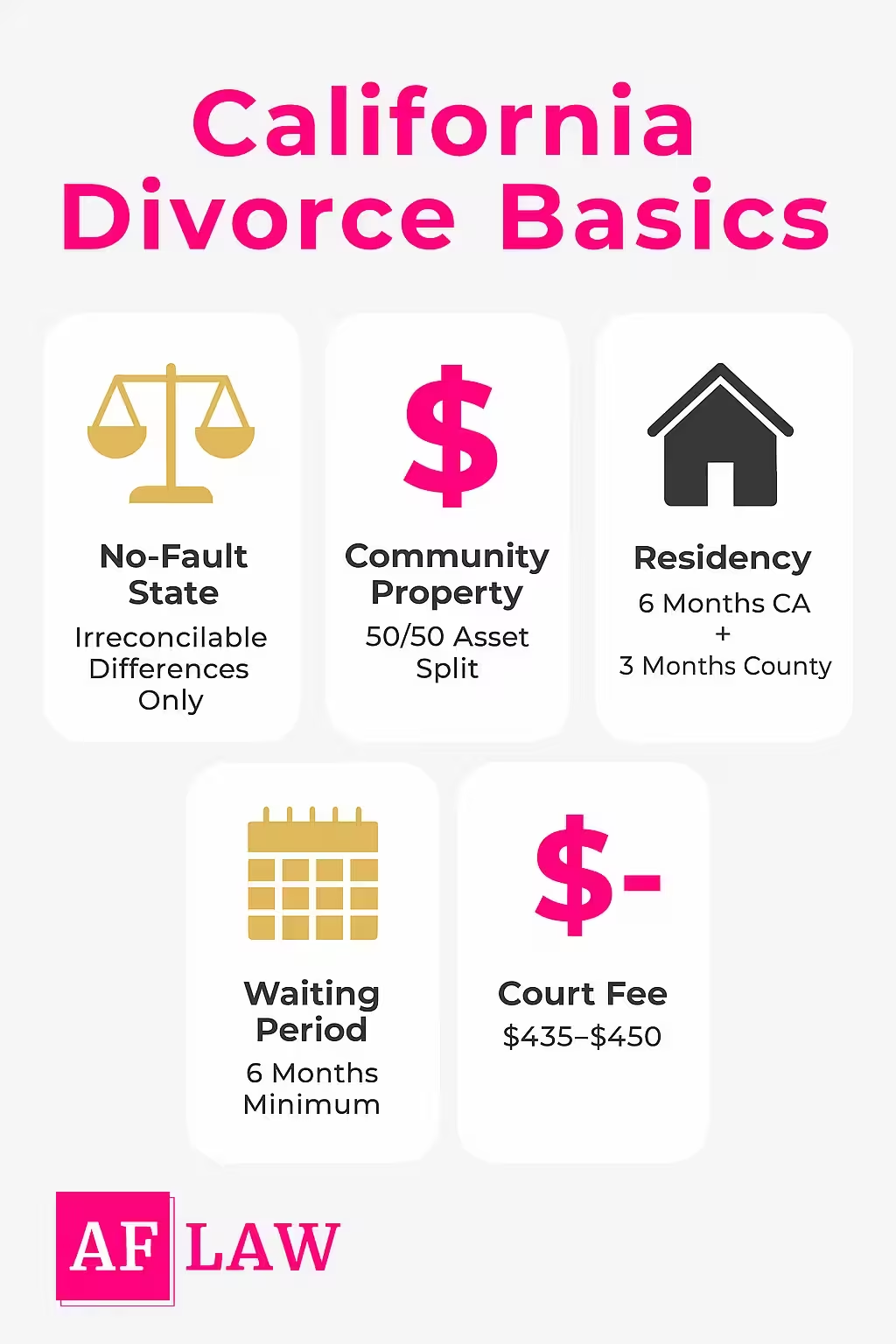Filing for divorce in California is more than just submitting paperwork — it’s an emotional, life-altering process filled with legal complexities that can feel overwhelming, especially in the state’s intricate family court system. Whether you're initiating the divorce or responding to it, the decisions you make early on can have a lasting impact on your finances, your family, and your future. It's natural to feel lost or uncertain, but you don’t have to go it alone.
According to the 2019 California Justice Gap Study, nearly 70% of family law cases involve at least one person representing themselves without any legal guidance. While this may initially seem like a way to save money, it often leads to costly mistakes and missed opportunities. A highly experienced Sacramento divorce attorney doesn’t just file forms — she helps protect your interests, streamline the process, and ultimately save you money, time, and stress. In this comprehensive guide, we’ll walk you through the 8 essential steps to filing for divorce in California.
Understanding California's Divorce Laws

California holds a unique position as both a no-fault and community property state, which fundamentally shapes how divorce proceedings unfold. These foundational legal principles impact everything from the grounds for filing to the division of assets between spouses.
- No-Fault Divorce System: California pioneered no-fault divorce in 1970, eliminating the need to prove spousal misconduct. The only grounds required are "irreconcilable differences", meaning the marriage has broken down to the point where it cannot be saved.
- Community Property Division: All marital property acquired during marriage is subject to equal 50/50 division between spouses. This includes income, real estate, retirement accounts, and debts accumulated during the marriage, regardless of which spouse's name appears on the title.
- Residency Requirements: You must establish California residency for at least six months and county residency for three months before filing divorce papers. This requirement ensures California courts have proper jurisdiction over your divorce case.
- Mandatory Waiting Period: California law requires a minimum six-month waiting period from the date the other spouse is served with divorce papers before the court can issue a final judgment. This cooling-off period cannot be waived under any circumstances.
Understanding these fundamental principles provides the foundation for making informed decisions throughout your divorce proceedings. Proper knowledge of California's unique legal framework helps avoid costly mistakes and ensures compliance with state requirements.
Step-by-Step Filing Process
Filing for divorce in California involves a systematic legal process that must be followed precisely to ensure your case proceeds smoothly. Each step builds upon the previous one, creating a comprehensive record for the court while protecting your legal rights throughout the dissolution process.
Step 1: Establish Grounds for Divorce
California's no-fault divorce system requires only one reason for the divorce: irreconcilable differences between spouses that have caused the irretrievable breakdown of the marriage. Unlike fault divorce states, you don't need to prove adultery, abandonment, or other misconduct by your spouse.
Important note: Legal separation is an alternative option that maintains the marriage while allowing couples to live apart and resolve financial matters.
Step 2: Gather Essential Documents and Information
Comprehensive documentation forms the backbone of any successful divorce case, particularly in determining property division and financial support. Begin collecting financial information, including tax returns for the past two years, bank statements, credit card statements, mortgage documents, and retirement account statements.
You'll also need personal identification documents, the marriage certificate, birth certificates for any minor children, and records of separate property owned before marriage. Complete financial disclosure is mandatory under California law, making thorough documentation crucial for your case.
Step 3: Complete Required Court Forms
The primary divorce papers include the following:
- Form FL-100 (Petition for Dissolution)
- FL-110 (Summons)
- FL-105 (Declaration Under Uniform Child Custody Jurisdiction and Enforcement Act) if you have minor children.
Additional forms may include FL-142 (Schedule of Assets and Debts) and FL-150 (Income and Expense Declaration).
These court forms must be completed accurately to avoid delays in your divorce proceedings. The family law clerk's office can provide forms but cannot offer legal advice on completion.
Step 4: File Forms with the Court Clerk
Submit your completed divorce papers to the family law clerk's office in the county where you meet residency requirements. The filing fee ranges from $435 to $450; however, fee waiver applications are available for those who qualify based on their income.
Important note: Request certified copies of your filed documents, as you'll need them for serving your spouse and future court proceedings.
Step 5: Serve Divorce Papers on Your Spouse
California law requires formal service of divorce papers on the other spouse within 60 days of filing for divorce. Service can be accomplished through personal service by a process server, certified mail with return receipt, or publication if your spouse cannot be located.
The person serving papers must be at least 18 years old and not a party to the case. Your spouse then has 30 days to file a response after being served with the summons and complaint.
Step 6: Complete Financial Disclosures
Both parties must exchange preliminary and final financial disclosures, providing complete information about income, expenses, assets, and debts. This mandatory disclosure ensures transparency and fair division of marital estate.
Failure to provide accurate financial disclosure can result in severe penalties, including setting aside the final judgment years later.
Step 7: Negotiate Settlement or Prepare for Trial
Most divorcing couples reach settlement agreements through negotiation, mediation, or collaborative divorce rather than going to trial. Settlement negotiations cover property division, spousal support, child custody arrangements, and child support, if applicable.
If a settlement cannot be reached, the case proceeds to trial, where a judge makes final decisions on contested issues.
Step 8: Obtain Final Judgment
Once all issues are resolved, either through settlement or trial, the court issues a final judgment of dissolution. This document legally ends your marriage and establishes all terms of your divorce, including property division and ongoing support obligations.
The final judgment cannot be entered until at least six months have passed since your spouse was served with divorce papers.
Understanding Costs and Fees
California divorce costs vary significantly depending on the complexity of your case and the level of conflict between spouses. Understanding these potential expenses helps you budget appropriately and make informed decisions about how to proceed with your divorce case.
- Court Filing Fee: $435 to $450 required at the time of filing, with fee waiver applications available for qualifying low-income individuals.
- Service of Process: $40 to $100 for a professional process server, though certified mail service costs significantly less.
- Attorney Fees: Sacramento family law attorneys typically charge between $250 and $600 per hour, with total costs ranging from $4,100 for uncontested cases to over $20,000 or more for complex contested divorces.
- Mediation Costs: $200 to $1,000 per hour for private mediators, with total costs averaging $3,000 to $8,000 for complete case resolution.
- Expert Witness Fees: $1,000 to $10,000+ for business valuations, real estate appraisals, or child custody evaluations when needed.
- Court Reporter Fees: $300 to $500 per day for depositions or trial testimony if required.
Conflict between the parties is the primary cost driver, with each contested issue that goes to trial doubling or tripling your total expenses.
Dividing Property and Debts
California's community property system requires equal division of all marital assets and debts, making property division attorney guidance crucial for protecting your financial interests. Understanding how courts classify and divide property helps ensure fair distribution of your marital estate.
Community vs. Separate Property Classification
Community property includes all income, assets, and debts acquired during marriage, regardless of which spouse's name appears on title documents. This encompasses salaries, real estate purchases, retirement account contributions, business interests, and credit card debts accumulated during the marriage.
Separate property remains with the original owner and includes assets acquired before marriage, inheritances received by one spouse, and gifts specifically given to that spouse. Property acquired after separation may also be classified as separate property depending on circumstances.
Valuation and Division Process
The fair market value of all community assets must be established through professional appraisals, financial statements, or expert testimony. Complex assets, such as businesses, professional practices, or restricted stock options, may require specialized valuation experts.
The court aims for an equal division but may award offsetting assets rather than requiring the sale of significant assets, such as the family home. One spouse may receive the house, while the other gets an equivalent value in retirement accounts or other investments.
Debt Responsibility
Community debts are divided equally between spouses, even if only one spouse's name appears on the account. This includes mortgages, credit cards, personal loans, and tax obligations incurred during marriage.
Important note: While the court divides debt responsibility between spouses, creditors can still pursue either spouse for the full amount of community debts.
Complete disclosure and accurate valuation form the foundation of fair property division under California law. Working with experienced legal counsel ensures the protection of your financial interests throughout this complex process.
Mediation and Collaborative Divorce Options
Mediation and collaborative divorce offer cost-effective alternatives to traditional litigation, allowing divorcing couples to maintain control over their outcomes while reducing conflict. These alternative dispute resolution methods often produce more satisfactory results for both parties and any minor children involved.
Divorce Mediation Benefits
Mediation success rates range from a conservative 50%, according to the Divorce Mediation Research Project, to as high as 80% in some studies, making it a highly effective resolution method. A neutral mediator helps facilitate negotiations between spouses to reach mutually acceptable agreements on all divorce issues.
Benefits of mediation include:
- Cost Savings: Mediation typically costs between $6,500 and $14,000 compared to $20,400+ for contested litigation.
- Privacy Protection: Mediation proceedings remain confidential, unlike public court records.
- Faster Resolution: Most mediated divorces resolve within 2 to 6 months versus 12+ months for litigation.
- Preserved Relationships: Collaborative problem-solving maintains better co-parenting relationships post-divorce.
- Greater Control: Parties craft their own solutions rather than having outcomes imposed by a judge.
Collaborative Divorce Process
Collaborative divorce involves both spouses and their attorneys working together in a series of structured meetings to resolve all issues without the need for court involvement. Each party signs an agreement committing to a settlement without litigation threats.
Benefits of collaborative divorce include:
- Team Approach: Neutral financial experts and child specialists can be included as needed.
- Interest-Based Solutions: Focus on underlying needs rather than positional bargaining.
- Reduced Emotional Trauma: A cooperative atmosphere minimizes stress on children and family relationships.
- Creative Solutions: Flexibility to craft unique arrangements that work for your specific family situation.
Mediation may not be appropriate in cases involving domestic violence or significant power imbalances between spouses. Sacramento County requires mandatory mediation for child custody disputes, demonstrating the court system's recognition of mediation's effectiveness in family law cases.
Useful California Resources
California provides numerous official resources to help self-represented parties navigate the divorce process effectively. These government- and court-sponsored programs offer valuable information and assistance to individuals proceeding without full legal representation.
- California Courts Self-Help Center: provides comprehensive divorce information, forms, and step-by-step instructions for self-represented litigants.
- California Department of Child Support Services: offers child support calculation tools and enforcement services for establishing and collecting support orders.
- State Bar of California: provides attorney referral services and educational resources about family law rights and procedures.
These official resources provide reliable information and assistance to help navigate California's family law system. Utilizing these services can significantly reduce costs while ensuring compliance with legal requirements throughout your divorce proceedings.
With Our Help, Take Control of Your California Divorce Today
Filing for divorce in California requires careful attention to legal procedures, from establishing residency requirements to completing mandatory financial disclosures. Understanding the state's no-fault system and community property laws helps ensure fair resolution of your marital estate and family arrangements.
AF Law Firm provides comprehensive family law attorney services throughout Sacramento County, combining over 14 years of experience with a direct, results-focused approach to divorce proceedings. Our advanced knowledge and skills help clients protect their financial interests and parental rights. Contact us today to discuss your specific situation and explore the most effective path forward for your family's future.


%205.avif)



